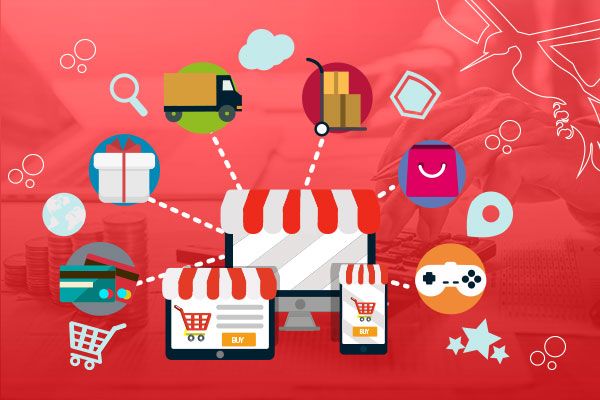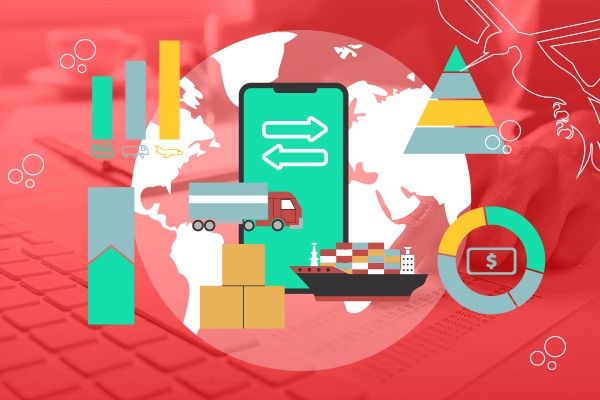E-commerce platforms are online platforms that enable companies to sell products and services to customers. These platforms provide a digital marketplace where merchants can showcase their products, set prices, manage inventory, and process payments.
In the digital age, e-commerce platforms have become increasingly popular in recent years with the rise of online shopping. Consumers have more options than ever,
so they offer numerous advantages compared to traditional retail models. Companies can now reach customers all over the world and easily choose the right platform for their growing e-commerce needs by integrating with Phenix systems.
What are e-commerce platforms and why are they important for online businesses?
E-commerce platforms are modern software solutions that enable merchants, business owners, and entrepreneurs to create online stores to sell their products or services to customers over the Internet.
These platforms are characterized by their ease of use and enable individuals and companies to conduct their business without any time restrictions or geographical barriers through the platform with ease and efficiency.
4 types of commerce dealing with e-commerce platforms
-
Business-to-Business (B2B):
This type of e-commerce includes electronic transactions for the sale of goods or services between two companies, rather than between a company and a consumer. B2B relationships usually involve manufacturers, suppliers, distributors, wholesalers, retailers, and service providers.
-
Consumer-to-Consumer (C2C):
This type of e-commerce includes all electronic transactions for the sale of goods or services between consumers. Typically, transactions are conducted through a third party via online platforms or other channels without the involvement of a mediator.
-
Business-to-Consumer (B2C):
The term Business-to-Consumer refers to establishing direct electronic business relationships between companies and consumers, facilitating the exchange of products or services more easily and dynamically, in line with retail sales in traditional commerce.
-
Consumer-to-Business (C2B):
This type of e-commerce is particularly common in crowdsourcing projects, where a large number of individuals offer their services or products for sale to companies looking for these specific types of services or products.
How have e-commerce platforms evolved over the time?
Technology, innovation, and entrepreneurship have been an integral part of reducing business costs and bringing producers and consumers closer together worldwide.
In the 1990s and the early decades of the 21st century, the widespread adoption of the Internet, mobile phones, and other technologies led to a reduction in communication and information costs,
which enabled the emergence of e-commerce markets as active players. These platforms provided a centralized market that allowed sellers to display their products and enabled buyers to browse and purchase from multiple vendors, which facilitated the emergence of more intelligent and efficient production methods.
What are the benefits of e-commerce?
-
Suitability of customer conditions:
E-commerce platforms provide convenience for customers and offer the ease of shopping for anyone, anywhere, and at any time without the need to leave their home or office, making it easier for customers to purchase products and services despite differences in location, timing, and working hours.
-
Expanding the reach of the target groups:
Companies can expand their reach to target audiences outside their local area and sell to customers from all over the world, increasing efficiency in transactions and removing all barriers between people due to the availability of modern payment methods.
-
Reducing costs and increasing profits:
This type of commerce is cost-effective with increased profits resulting from it, as you pay minimal fees to open an online store without the need to buy or rent a physical store in addition to general costs.
-
Expanding product offerings:
E-commerce platforms have enabled companies to expand product offerings, increase sales, and enhance competition among companies, leading to innovation and improvements in customer service and pricing.
-
Risk avoidance:
E-commerce avoids many of the risks that businesses may face, as it reduces and minimizes many of the capital losses that often lead to project failure.
How to choose an e-commerce platform for your business?
Choosing the e-commerce platform that you will work on depends on clear criteria, specifically determining the goals of your online business activity and the impact of the platform on potential customers or sellers. Usually,
attention is focused on the many and diverse features and functions rather than the business activity goals, leading to increased costs without reflecting on the store's activity,
nature, or goals. Therefore, the most important criteria that should be searched for before choosing an e-commerce platform for your future store are:
-
Total cost:
launching an e-commerce platform requires developing a plan that fits your budget, including initial costs, maintenance, and upgrade costs, in addition to indirect costs such as shipping and paid accessories.
-
Multi-language support:
the languages of the audience that your online store targets should be identified, and language support in e-commerce platforms can be divided into two main parts, support in the control panel for managing the store using specific languages,
and support in the interface for using the language in communication with the visitor through browsing menus, product names, and other interface elements. -
Customization and scalability:
look for a system that allows you to customize the appearance and functions of your store online according to your brand's requirements, and your e-commerce store should be scalable, especially if you are looking to grow your business in the future.
Even if your store is small at the beginning, make sure that the e-commerce platform you choose can be suitable for your business. -
Analytics:
Analytics in e-commerce platforms refer to the use of your data and the analysis of various aspects of your business, identifying the status of the store, sales performance, customer behavior, marketing effectiveness,
best-selling products, and other data that helps the business owner achieve the best results, identify obstacles and overcome them, and develop marketing strategies with clear and achievable goals.
What are the most popular e-commerce platforms that integrate with Phenix systems ?
When it comes to e-commerce platforms, there are many options available with Phenix systems, and each platform has its own features and strengths.
Therefore, companies should carefully consider their needs and goals. Some of the most popular platforms that integrate with Phenix systems are:
-
Shopify Platform
This is one of the most popular e-commerce platforms available today, allowing the easy creation of an online store at the lowest possible cost. Its key features include speed in setting up stores, managing inventory, shipping, and accounting.
-
WooCommerce Platform
This is a custom add-on for the WordPress content management system that helps create a free online store with simple and easy steps, supporting multiple languages and currencies, making it the most common choice for companies in different countries.
. It allows the sale of various physical and digital services and products and offers many features such as inventory management, secure payments, shipping accounts, and taxes. -
Wix Platform
This famous platform allows you to create cloud-based websites. Wix platform enables you to create professional-looking websites quickly and easily without the need for advanced technical skills, choosing website design from a range of templates and features for various purposes.
-
Salla Platform
This is the first fully Arabic e-commerce platform in terms of creation, general site, and technical support. Its mission is to help you as a retailer create your own e-commerce store with the least cost and time, easily and simply, without requiring technical experience so that you can start your project and promote your goods.
-
Prestashop Platform
A popular open-source e-commerce platform allows businesses to create and manage their online stores. It offers a range of features and tools for managing products, orders, payments, shipping, and more.
Prestashop is highly customizable and can be adapted to suit the needs of different businesses and industries. Thousands of businesses around the world sell their products and services online use it.
What are the main features offered by Phenix Systems in integration with e-commerce platforms?
The integration between e-commerce platforms and Phenix Systems is of great importance in the digital market, as Phenix Systems enable you to automate and synchronize sales and marketing operations,
track customer interactions, and improve overall efficiency. The following are some of the main features of this integration:
-
Export of materials and category trees from Phenix systems to e-commerce sites:
Phenix Systems allow you to export data to e-commerce sites that must be synchronized with high accuracy and smoothness, including materials, products, inventory levels, pricing,
and other relevant information, and create integration between the two systems to ensure proper data synchronization at specified time intervals. -
Synchronization and updating of inventory balances on e-commerce sites:
Phenix Systems enable the synchronization and updating of material balances on e-commerce sites to ensure that customers are provided with accurate information about product availability,
using a warehouse management system to track and inventory material quantities, and the ability to update e-commerce sites with every synchronization. -
Import of customer data and creation of customer cards:
Phenix Systems provide the creation of cards for its customers within its easy-to-use programs by specifying customer information such as name, address, phone number, email address, and any relevant details, where that data can be imported into the program.
-
Import of new orders from e-commerce sites and generation of necessary invoices:
Phenix Systems allow for the import of new orders and the creation of invoices based on order information such as tax accounts, discounts, shipping costs, and invoice formatting
What are the three vulnerable points in the e-commerce environment?
E-commerce platforms strive to provide a safe environment for online transactions and have robust systems in place to address any difficulties that may arise, including:
-
Payment processing:
E-commerce platforms use payment gateways to securely process online payments, integrating multiple payment gateways to accept payment via credit cards, bank transfers, and other payment methods.
-
Security:
E-commerce platforms use data encryption to secure the transmission of sensitive information between the client's browser and the server, in addition to using firewalls and antivirus software to protect against hacking attempts.
-
Fraud prevention:
E-commerce platforms use fraud detection systems to identify and prevent fraudulent transactions by analyzing transaction data and detecting patterns that may indicate fraud.
They also use verification tools, such as matching customer invoice information with credit card information, and anti-fraud protection services, such as chargeback protection and fraud insurance, to help mitigate risks for merchants.
What role do e-commerce platforms play in the global economy, and how do they affect traditional businesses?
E-commerce platforms have played an important role in the global economy in recent years and have revolutionized the way people shop and sell goods and services.
They have provided a fast, convenient, and often cheaper alternative to traditional retail sales, which has had several impacts on the global economy, including:
-
Increased international trade:
E-commerce platforms have enabled companies to sell their products and services worldwide, breaking down geographic barriers and allowing companies to access new markets.
-
Cost reduction:
E-commerce platforms have allowed companies to reduce the need for physical stores and lower overhead costs such as rent and utilities, thus helping to reduce the cost of doing business.
-
Job creation:
The growth of e-commerce has led to the creation of many new jobs, such as web developers, digital marketers, and customer service representatives.
-
Entrepreneurship promotion:
E-commerce platforms have made it easier for small businesses and entrepreneurs to start their own businesses, as they no longer need to invest in a physical storefront to sell their products.
-
Consumer behavior impact:
Consumers can easily compare prices for goods and services, read reviews, and make purchases from anywhere and at any time, leading to greater convenience and efficiency in the purchasing process.
-
Innovation:
E-commerce platforms have spurred innovation in several areas such as online payment systems, mobile commerce, and personalized marketing.
-
Economic growth:
E-commerce has contributed to global economic growth, according to a report by the World Trade Organization, and e-commerce could increase global GDP by up to 3.7% by 2030.
Overall, e-commerce platforms have had a significant impact on the global economy, reshaping the way business is conducted and providing new opportunities for entrepreneurs and consumers alike.
In the end
E-commerce platforms have revolutionized the way we shop and conduct business online. These platforms provide a convenient and user-friendly interface for both consumers and sellers to buy and sell goods and services.
With the rise of mobile phones and internet usage, e-commerce platforms have become an essential part of our daily lives, allowing us to shop and sell from our homes or anywhere with an internet connection.
In short, e-commerce platforms have changed the way we conduct our business by creating more convenient market access for both consumers and sellers. With the continuous advancement of technology, e-commerce platforms will continue to evolve and provide more innovative solutions to meet the changing needs of the market.







Comments (0)